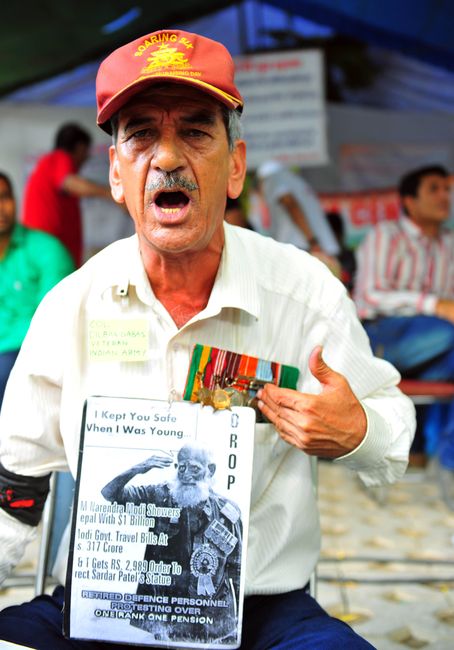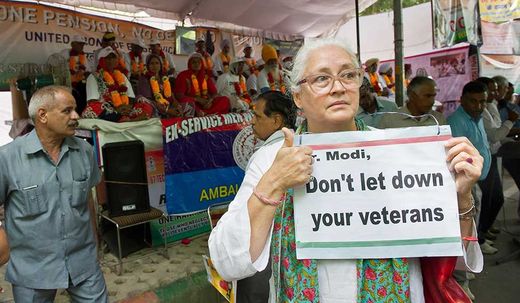 Warrior's woes: Colonel Dilbag Dabas, a 1971 war veteran, protesting at Jantar Mantar | Aayush Goel
Warrior's woes: Colonel Dilbag Dabas, a 1971 war veteran, protesting at Jantar Mantar | Aayush Goel
It was in Rewari, Haryana, that Narendra Modi kicked off his Lok Sabha election campaign. He had just been named the BJP’s prime ministerial candidate. On September 15, 2013, he addressed a mammoth rally, touted by his party as the biggest ever political outreach towards the armed forces. Termed as an ‘ex-servicemen’ rally, the meeting saw Modi wow the audience by passionately reaffirming his commitment to the interests of the military.
In that rally, Modi—flanked by former Army chief General V.K. Singh and former Army officer and Olympic medallist Rajyavardhan Singh Rathore—declared that if elected to power, he would fulfil the long-pending demand of the military veterans for One Rank, One Pension (OROP) within 100 days. The rally saw Modi take the pitch on OROP to a new high. He demanded that the UPA come out with a white paper on the status of OROP. He also said that if the BJP had come back to power in 2004, the OROP issue would have been resolved long back.
Suddenly, OROP—which entails that retired soldiers of the same rank and tenure of service will get the same pension irrespective of when they have retired—became an election issue. Through the rally, Modi appealed to the nationalistic feelings of the Indian electorate at large. This was clear when he said at the rally that only a nationalistic government at the Centre could provide security to the people.
Having taken the OROP issue to such a high pitch, Modi did not live up to the promise he made to the Army veterans. There was delay in the implementation of OROP and ex-servicemen launched an agitation. There were relay hunger strikes and sit-down protests at Jantar Mantar in New Delhi. Protestors said if the government was truly nationalistic, then it should accept their demands on OROP. After all, they said, Modi had promised so in Rewari.
The government had perhaps not foreseen such an angry reaction from Army veterans, and, after several rounds of talks with the agitators, it could now be on the verge of announcing OROP. According to government sources, an announcement on OROP was expected very soon, to beat the model code of conduct that would set in once the dates of the assembly elections in Bihar are announced by the Election Commission. It is learnt that Modi himself will make the announcement.
Several rounds of negotiations have taken place between the government and the agitating ex-servicemen. The frequency of these meetings increased over the last few days, with the prime minister himself closely monitoring the progress. The increased sense of urgency also has to do with the RSS asking the government to resolve the matter at the earliest. The prime minister’s Principal Secretary Nripendra Misra, too, has been meeting the agitators. Other intermediaries include BJP veteran Bhagat Singh Koshyari, who had headed a parliamentary committee that gave its report on OROP in 2011, Rural Development Minister Birender Singh and Rajya Sabha member Rajeev Chandrasekhar.
Koshyari, who has been involved in the negotiations, said the defence ministry had accepted his committee’s report in toto and that the finance ministry had also accepted it. “The only issue that is being discussed is the periodicity of the revision in pension. And, a solution to that would be found in the next two to three days,” he said. He said a committee could be formed under the defence ministry to work out the periodicity.
 Spouse support: Actor Nafisa Ali at Jantar Mantar. She introduces herself as "Colonel Sodhi's wife" | Sanjay Ahlawat
Spouse support: Actor Nafisa Ali at Jantar Mantar. She introduces herself as "Colonel Sodhi's wife" | Sanjay Ahlawat
Finance Minister Arun Jaitley had earlier said revision of pensions every month or every year was not possible. There are talks about legal issues, too. The Koshyari committee had been told that the government feared there would be a similar demand from other sectors, such as the paramilitary forces, the police and the railways. Ex-servicemen also allege that the bureaucracy has been resisting OROP.
It is now felt that the process of communication between the government and the veterans was not handled properly and the trust that was there all these years seems to have been dented for lack of communication. It is also felt that the negotiations were handled in a way not befitting the veterans’ demand for honour and status.
However, Modi is learnt to be keen on a resolution of the issue now. “Prime Minister Modi has made it very clear on several occasions that he is committed to delivering on the veterans’ right to OROP. I know that he is keen to ensure that this is done in a manner that meets the honour of the veterans and the government’s own various compulsions and limitations,” said Chandrasekhar.
Brigadier B.D. Mishra, who heads the BJP’s ex-servicemen cell, said it was wrong to criticise the government over OROP. “The prime minister had taken an oath at the Red Fort, standing under the Indian tricolour. We should wait for him to make an announcement,” Mishra said.
The Modi government has learnt the hard way that it is not easy to implement OROP. And, even if a resolution comes now, it comes after a loss of face and credibility. “Pension is not a demand,” said Col A.K. Kaul, a spokesman for the agitating ex-servicemen. “It is dues for services already rendered. The prime minister had started his campaign with the promise that OROP would be given. He is reneging on his word now. OROP is not difficult. If the prime minister wants it, it can happen.”
Angry over the delay in implementing OROP, ex-servicemen boycotted the golden jubilee celebrations of the 1965 war. Deeply upset over Modi not mentioning any specific date for implementing OROP in his Independence Day speech, they switched off the large screen TV which they had put up at Jantar Mantar to watch his address.
Post-Rewari, the prime minister had on October 23, 2014, during his Diwali visit to Siachen, said that it was in his destiny to fulfil OROP. In his budget speech on July 10, 2014, Jaitley, too, reaffirmed the government’s commitment to OROP and set aside Rs.1,000 crore for it.
However, as Modi’s critics now point out, he controversially declared on May 30, 2014 that “too many definitions of OROP were going around” and that his government was “looking for one on which all stakeholders agree.” That the Delhi Police attempted to remove the protesting ex-servicemen from Jantar Mantar on the eve of the Independence Day also did not help Modi’s cause.
The Congress has gleefully latched on to Modi’s discomfiture, attacking him for having used OROP as an “election tool” and then not doing anything about it. Senior Congress leader Capt Amarinder Singh said, “It was a matter of just Rs.9,000 crore, which should not mean much, particularly when it concerns the welfare of the people who gave their lives to safeguard our borders and won our wars.”
The party is also now reminding the people that it was the United Progressive Alliance which had accepted the Koshyari committee report in toto and announced its implementation. The then finance minister P. Chidambaram had announced the scheme in his interim budget speech in February 2014 and announced a transfer of Rs.500 crore to the Defence Pension Account to “close the gap for all retirees (pre-2006 and post-2006) in all ranks”.
However, it has to be noted that the UPA had a sudden change of heart on OROP—from having told Parliament that it cannot be implemented to making a budgetary provision for it in the vote-on-account before the Lok Sabha elections.
The defence ministry under A.K. Antony had opposed OROP before the Koshyari committee. In reply to a question in the Rajya Sabha in November 2010, Antony said that his government could not accept OROP. “Since the issue of One Rank, One Pension was not accepted in the past and also, more recently, the cabinet secretary’s committee set up on OROP and other related issues did not recommend the same, it has not been found feasible to accept the demand....”
In fact, short of accepting OROP, Antony, between 2009 and 2012, allocated an extra Rs.4,500 crore to bring parity in pension of the armed forces, especially with the aim of assuaging the heartburn caused by the rise in pay scales of government employees, post the recommendations of the Sixth Pay Commission in 2009. He gave out an extra Rs.2,200 crore in 2009 to enhance the pension of junior commissioned officers and lower ranks. Another tranche of Rs.2,300 crore was announced for the officer ranks in 2012.
Capt Praveen Davar, former co-convener of the ex-servicemen cell of the Congress, said OROP in the true sense of the word was not possible and that the ex-servicemen would do well to settle for “parity in pension”. “It has to be noted that the pensions that the ex-servicemen now get are far, far better than what they got around a decade ago,” he said.
However, things changed after the Rewari rally, and after an intervention by Congress vice president Rahul Gandhi. The UPA government accepted Koshyari committee’s recommendations on OROP. And, on February 27, 2014, Antony announced that the UPA would implement OROP by April 1, 2014.
So, Modi’s aggressive campaign on the issue forced the Congress to come around. In election season, no one was particularly bothered about the implementability of OROP. However, the angry military veteran will not allow Modi to forget his election promise.





